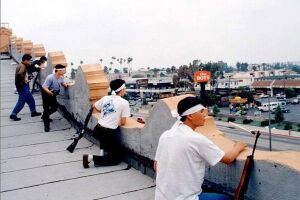2017 South Oceanica unrest: Difference between revisions
(Created page with "{{under construction}} {{Region icon MusgorociaSC}} {{Infobox military conflict | conflict = 2017 South Oceanica unrest | partof = the Amihan Russel incidents | im...") |
No edit summary |
||
| Line 23: | Line 23: | ||
The '''2017 South Oceanica unrest''' was a period of civil and political unrest in South Oceanica. | The '''2017 South Oceanica unrest''' was a period of civil and political unrest in South Oceanica. | ||
In March 2017, Stanley Bowden of the right-wing United National Front (UNF) party won the South Oceanican presidential election, sending shockwaves throughout the country. Protests and rioting spread throughout Dwanesbury, the country's capital, with crowds burning down several buildings, destroying cars and setting alight thousands of books related to conservatism and capitalist economics. The rioters were composed of a wide variety of groups opposed to Bowden; feminists, members of the black supremacist organisation Black Rising, transsexuals, homosexuals, climate activists, members of Antifa and furries, to name a few. The demonstrations went on for three days, causing millions of dollars worth of damage and leaving many innocent bystanders badly injured. From the beginning, there were allegations by right-wing media outlets that the protesters were receiving clandestine funding from unknown foreign entities, however, these were dismissed as 'conspiracy theories' by mainstream | In March 2017, Stanley Bowden of the right-wing United National Front (UNF) party won the South Oceanican presidential election, sending shockwaves throughout the country. Protests and rioting spread throughout Dwanesbury, the country's capital, with crowds burning down several buildings, destroying cars and setting alight thousands of books related to conservatism and capitalist economics. The rioters were composed of a wide variety of groups opposed to Bowden; feminists, members of the black supremacist organisation Black Rising, transsexuals, homosexuals, climate activists, members of Antifa and furries, to name a few. The demonstrations went on for three days, causing millions of dollars worth of damage and leaving many innocent bystanders badly injured. From the beginning, there were allegations by right-wing media outlets that the protesters were receiving clandestine funding from unknown foreign entities, however, these were dismissed as 'conspiracy theories' by mainstream news organisations and the political establishment in South Oceanica. At the same time, they began making unsubstantiated claims that the Nifonese government may have interfered in the election to help Bowden, further aggravating the protesters. | ||
Eventually, the crowd began marching towards Little Kiyosu, the most important hub for the Nifonese community in South Oceanica. | Eventually, the crowd began marching towards Little Kiyosu, the most important hub for the Nifonese community in South Oceanica. The foreign intelligence service of Nifon, the Gunpeitai, successfully kept the community supplied while locals barricaded their premises and fortified the district. an initial assault by protesters was repelled, with the Nifonese only suffering a few wounded. Several protesters were captured and taken prisoner. With plans for a second attempt at assaulting Little Kiyosu, the protesters set up a camp on the side of the river opposite the district. in the middle of the night, the Nifonese attacked preemptively with two armoured, flamethrower-equipped bulldozers, killing dozens. The deaths triggered condemnation and further widespread violence across South | ||
Oceanica, with further attacks on Nifonese and other immigrants who the protesters perceived as being supportive of Bowden. | |||
Unable to control the situation, a unknown politician between the United National Front contacted Conquistador Security Consulting to intervene. What followed was a massive and unprecedented operation by Conquistador to restore law and order to the country, supported by Bowden. Thousands of protesters were forced to flee the country, mostly going to [[Kesslerstaadt]]. | |||
==See also== | ==See also== | ||
Revision as of 03:34, 12 June 2020
This article or section is in the process of an expansion or major restructuring. You are welcome to assist in its construction by editing it as well. If this article or section has not been edited in several days, please remove this template. If you are the editor who added this template and you are actively editing, please be sure to replace this template with {{in use}} during the active editing session. Click on the link for template parameters to use.
This article was last edited by Greater Carloso (talk | contribs) 4 years ago. (Update timer) |
| 2017 South Oceanica unrest | |||||||
|---|---|---|---|---|---|---|---|
| Part of the Amihan Russel incidents | |||||||
 | |||||||
| |||||||
| Belligerents | |||||||
|
Feminists Antifa Black Rising Homosexual revolutionaries Various other rioters and protesters |
| ||||||
| Commanders and leaders | |||||||
|
Amihan Russel (secretly) Steven Nordholt (secretly) Gene Karlson Frieda Jackson |
| ||||||
| Strength | |||||||
| Thousands | 2 killdozers | ||||||
| Casualties and losses | |||||||
| Hundreds killed | Neglible | ||||||
The 2017 South Oceanica unrest was a period of civil and political unrest in South Oceanica.
In March 2017, Stanley Bowden of the right-wing United National Front (UNF) party won the South Oceanican presidential election, sending shockwaves throughout the country. Protests and rioting spread throughout Dwanesbury, the country's capital, with crowds burning down several buildings, destroying cars and setting alight thousands of books related to conservatism and capitalist economics. The rioters were composed of a wide variety of groups opposed to Bowden; feminists, members of the black supremacist organisation Black Rising, transsexuals, homosexuals, climate activists, members of Antifa and furries, to name a few. The demonstrations went on for three days, causing millions of dollars worth of damage and leaving many innocent bystanders badly injured. From the beginning, there were allegations by right-wing media outlets that the protesters were receiving clandestine funding from unknown foreign entities, however, these were dismissed as 'conspiracy theories' by mainstream news organisations and the political establishment in South Oceanica. At the same time, they began making unsubstantiated claims that the Nifonese government may have interfered in the election to help Bowden, further aggravating the protesters.
Eventually, the crowd began marching towards Little Kiyosu, the most important hub for the Nifonese community in South Oceanica. The foreign intelligence service of Nifon, the Gunpeitai, successfully kept the community supplied while locals barricaded their premises and fortified the district. an initial assault by protesters was repelled, with the Nifonese only suffering a few wounded. Several protesters were captured and taken prisoner. With plans for a second attempt at assaulting Little Kiyosu, the protesters set up a camp on the side of the river opposite the district. in the middle of the night, the Nifonese attacked preemptively with two armoured, flamethrower-equipped bulldozers, killing dozens. The deaths triggered condemnation and further widespread violence across South Oceanica, with further attacks on Nifonese and other immigrants who the protesters perceived as being supportive of Bowden.
Unable to control the situation, a unknown politician between the United National Front contacted Conquistador Security Consulting to intervene. What followed was a massive and unprecedented operation by Conquistador to restore law and order to the country, supported by Bowden. Thousands of protesters were forced to flee the country, mostly going to Kesslerstaadt.
